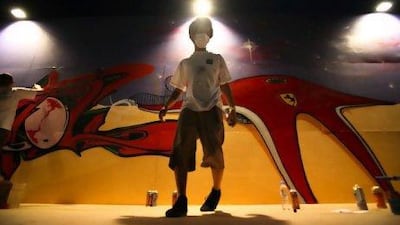Giorgio Mardinian commuted to Abu Dhabi today for the second time this week to spray-paint a wall.
The self-proclaimed graffiti addict and his fellow artists worked on a huge mural on Yas Island, commissioned to complement the hip-hop musical stylings of Nelly Furtado, who will perform in the capital tonight.
It was the second of two days of graffiti festivities led by the British artist Tom "Inkie" Bingle.
It may not be the underground canvas that some graffiti artists dream of - the side of a train, a seemingly impossible-to-reach highway sign - but in the UAE, where there is zero tolerance for vandalism, street artists such as Mr Mardinian have accepted that if they cannot practise their art on the street, they can fulfil their passion at sanctioned venues and organised events.
And, surprisingly, there are plenty of them. Mr Mardinian, a 30-year-old from Italy, finds an event to attend almost every week at malls or nightclubs, for MTV Arabia, or for the clothing store Topshop.
"Nowadays graffiti is very commercial. It's wanted in commercials, video clips, backdrops, nightclubs, restaurants," he said.
At heart, Mr Mardinian is a purist. Instead of drawing figures, he sticks to lettering, the original graffiti form. He misses his underground days in the UK, where he lived for a decade and got caught by police four times. And every year when he visits family in Lebanon, where graffiti goes unpunished, he goes out spraying until three in the morning.
"When you're doing it illegally, you're getting a buzz out of it - adrenaline. When you're doing it legally, it's half the fun - especially when you get commissioned to do something," he said.
Still, as the only outlet for their creativity, he and other graffiti artists in the UAE appreciate the events, and often organise them themselves.
Kris "Bozign" Balerite, a 27-year-old Filipino who grew up in Dubai, puts together spray-painting and other hip-hop-related events every week. That is the only way to build appreciation for them, he said.
"We don't just stand in the background and say, 'Why don't they have stuff like this in Dubai?'," he said. By promoting street art and street music, he said, "it will bear fruit some day".
Mr Balerite, who paints characters and images, said he discouraged illegal work because it gave the genre a bad name. "I'm an artist," he said. "I want to do my thing in a gallery."
In addition to opening exhibits or holding workshops, local artists can find commissions in clubs that host hip-hop DJs from abroad, or as backdrops in television commercials.
They have an open invitation from the Dubai Festival City Mall to paint a fence that encircles a parking lot.
It sits next to a park for skaters, which is a sport often associated with graffiti, explained Tom Miles, the director of shopping centres for Al Futtaim Group, which runs Festival City.
Mr Bingle, the British artist, said he supported promoting all categories of the art - both lettering and drawing - in galleries and in public places. He was just glad their skills had become viable as a profession, namely graphic design.
"When I was younger, you weren't really encouraged to do it as a career path," he said.
"Graffiti people see it as going out and doing it illegally. That's how it started, but it doesn't have to stay there," he said. "They're quite purist."
Now Mr Bingle teaches others, leading workshops for children as young as six and lecturing college students in graphic design.
On Yas Island, he and other graffiti friends from the UK led workshops for children. Local artists helped them paint the mural, which portrayed a day-to-night scene with the Abu Dhabi skyline on one side and Yas Island on the other.
Mr Mardinian grabbed the chance to participate, even if it meant driving back to Abu Dhabi. He had already made the trip on Sunday for a separate graffiti gathering after the organiser gave him a call.
"He told me, 'We need you to come down and represent'," Mr Mardinian said. "So I said, 'The pleasure's all mine, I'm there'. You just say it, and I'm there."

